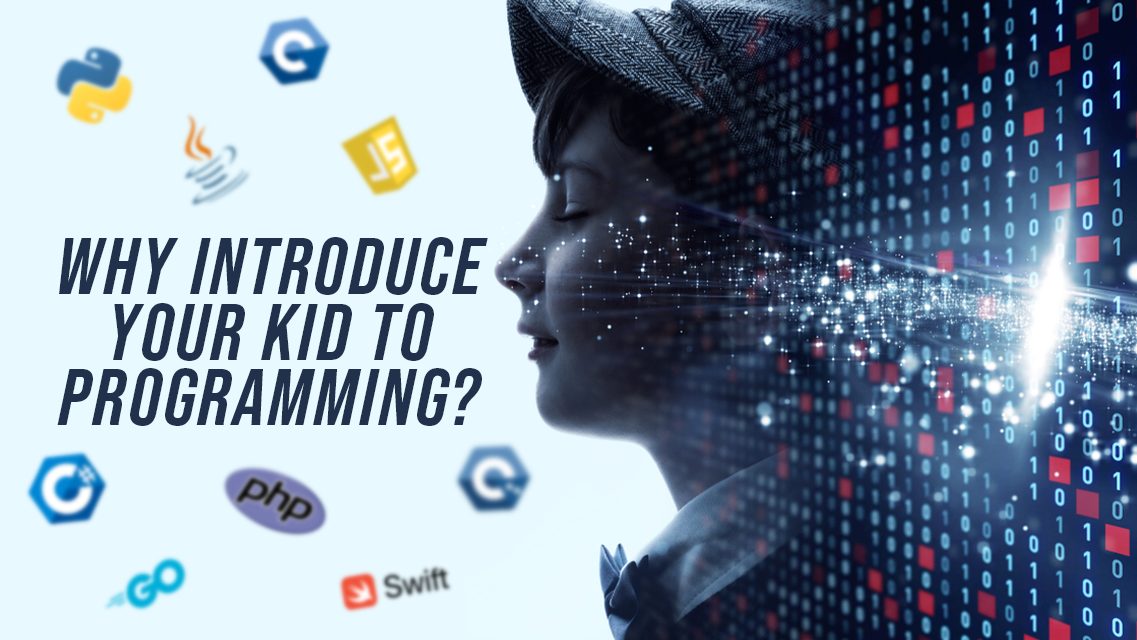Coding for Kids: Why Introduce Your Kid To Programming?
In the rapidly advancing digital world, the question of whether to introduce your child to programming is no longer a mere consideration, but a necessary and important decision. Coding for kids has transformed from a niche skill to an essential tool that empowers young minds to navigate the complexities of the modern world. As technology continues to shape our lives, equipping children with coding skills from an early age sets the stage for a future where they can not only adapt but thrive.
By introducing your kid to programming, they embark on a journey of creativity, problem-solving, and innovation. Beyond the ability to write code, they learn to approach challenges with a structured mindset, breaking down problems into manageable steps. This cognitive agility extends beyond the digital realm, enhancing their analytical skills and fostering a mindset of lifelong learning. As we usher in an era where technology intersects every facet of society, introducing kids to programming is akin to providing them with a universal language that opens doors to endless opportunities.
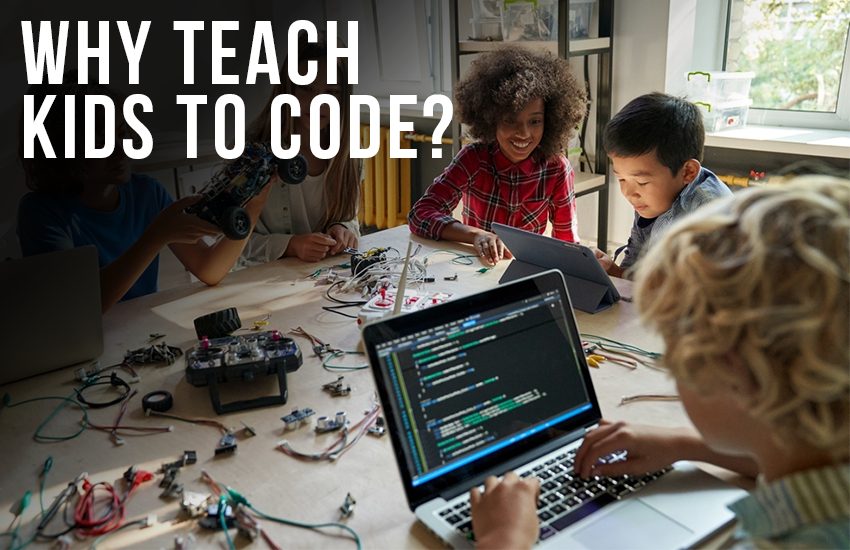
Why Teach Kids to Code?
Fostering Critical Thinking
Coding isn’t just about creating software or apps; it’s a way of thinking. It encourages kids to break down complex problems into smaller, manageable steps. As kids learn to code, they develop critical thinking skills that are essential for problem-solving in any field.
Studies show that kids who start learning coding at a young age are more likely to excel in problem-solving skills and critical thinking. (Source: National Association for Media Literacy Education)
Creativity Unleashed
Programming is a canvas where kids can bring their imaginative ideas to life. From designing their games to building interactive stories, coding for kids provides a platform to unleash their creativity and transform their visions into reality.
Future-Ready Skills
In the digital era, coding is a valuable skill that opens doors to various opportunities. Learning to code at a young age equips kids with a skill set that will be in high demand in their future careers.
Kids as young as 4 years old can start learning basic coding concepts. Age-appropriate tools like Scratch make it accessible and enjoyable for even the youngest learners.
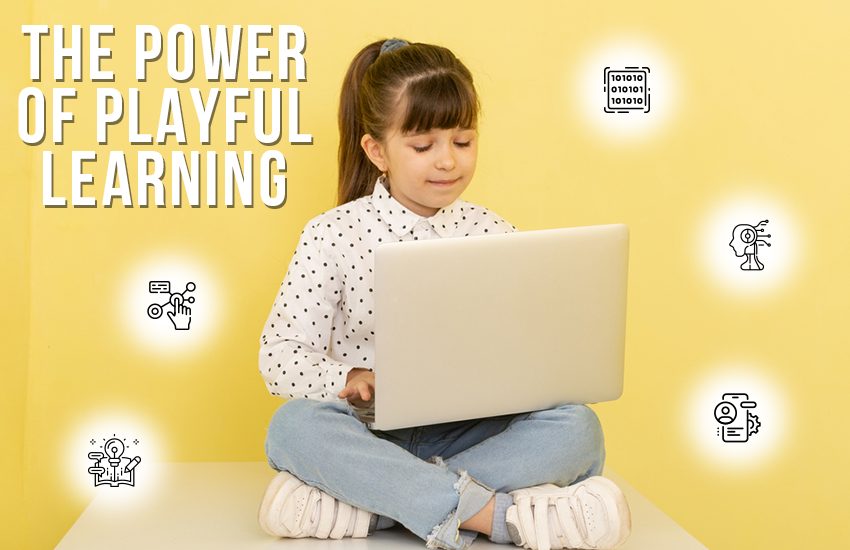
The Power of Playful Learning
Building Algorithms through Storytelling
Introduce coding principles using storytelling to kids. Kids learn to build algorithms by crafting narratives, making coding not just a technical skill but also a form of creative expression.
Interactive Learning Environment
Provide an interactive learning environment where kids can experiment, make mistakes, and learn from them. Help and guide them through the coding process, ensuring a smooth learning journey.
Gamified Coding Challenges
Learning through play should be the core approach to teaching coding to kids. Gamified coding challenges turn programming into an exciting adventure, keeping kids motivated and eager to explore new coding concepts.
Visual Programming
Introduce them to drag-and-drop interface platforms like Blockly and Tynker, which empowers kids to create code visually, eliminating the need for complex syntax. This approach allows them to focus on the logic behind coding rather than getting caught up in intricate details.
Real-Life Applications
Connect coding with real-life applications that resonate with kids. From creating animations to building simple games, kids can see how their coding skills translate into tangible and enjoyable outcomes.
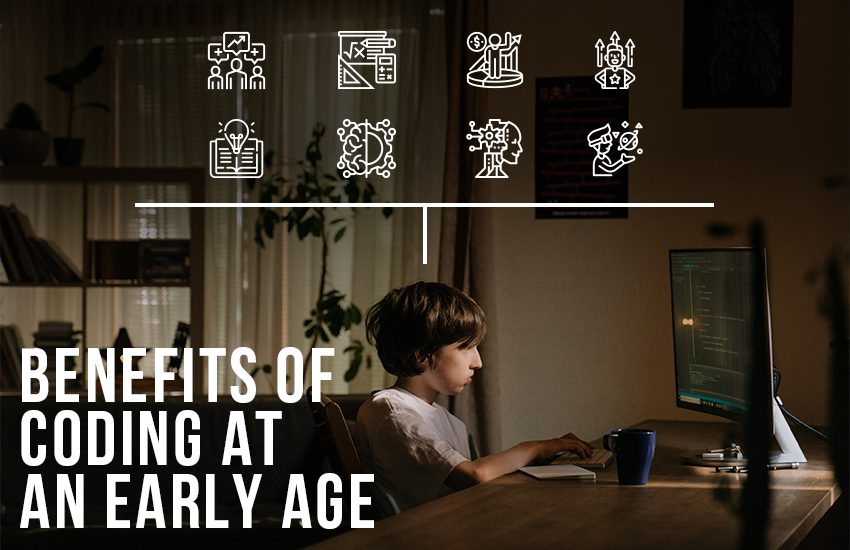
Benefits of Coding at an Early Age
Growing Demand
By 2025, it’s estimated that there will be over 1.4 million computing-related job openings, with a shortage of qualified candidates to fill them. Learning coding early can give kids a competitive edge. (Source: Code.org)
Improves Math Skills
Coding involves mathematical concepts like patterns and algorithms. Learning to code can enhance kids’ math skills and make abstract math concepts more relatable.
Diverse Opportunities
Coding isn’t just for tech jobs. It’s essential in fields like healthcare, finance, and even art. Coding for kids enables them to explore a wide range of exciting careers in the future. (Source: National Center for Women & Information Technology)
Boosts Confidence
As kids see their code come to life, they gain a sense of accomplishment and confidence in their abilities. This confidence extends beyond coding and positively impacts other areas of their lives.
Hands-On Learning
Coding encourages hands-on learning, allowing kids to experiment, make mistakes, and learn from them. This experiential learning approach fosters a deeper understanding of concepts and trains their brains to break down every problem and solve it logically.
Cognitive Development
Coding stimulates cognitive development by promoting logical thinking, sequencing, and problem-solving skills. It’s like a workout for the brain!
Inclusivity
Coding breaks down barriers. It’s a language that transcends borders and can be learned by kids of all backgrounds. Plus, there’s a growing emphasis on increasing diversity in tech fields.
Future-Proof Skills
In a rapidly changing technological landscape, coding skills are a valuable asset. Kids who learn to code today will be better equipped to adapt to new technologies in the future.
How To Introduce Your Kid To Programming?
Till now, we’ve discussed the importance of coding for kids at an early age and how to introduce your kid to programming but the real obstacle majority of the parents face is the roadmap of programming and where to start. By following this roadmap and step-by-step guide, parents can guide their kids on an exciting journey into the world of programming and coding, nurturing their creativity, and problem-solving abilities, and preparing them for a technology-driven future.
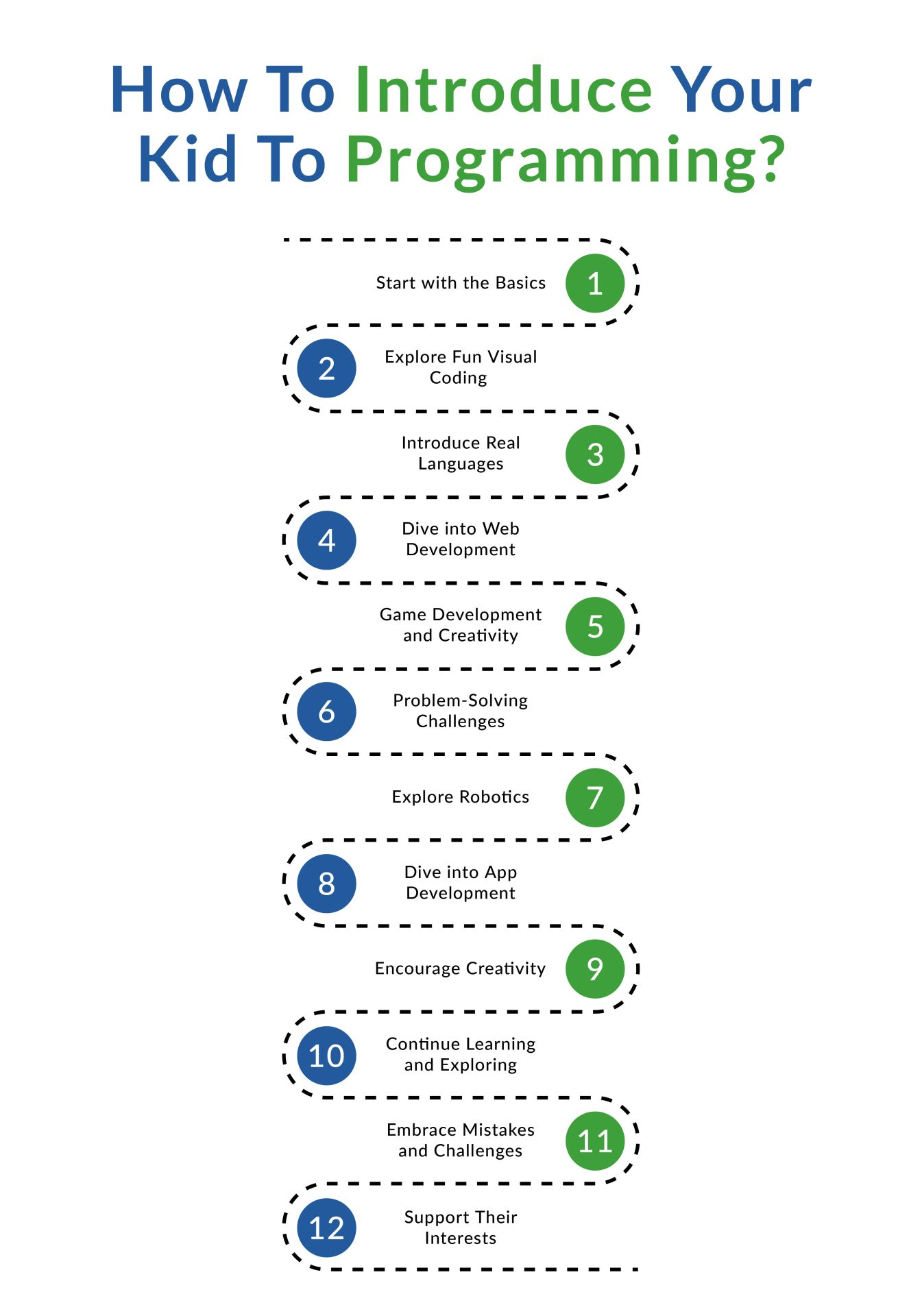
-
Start with the Basics:
Understanding Coding: Explain what coding is and how it makes computers work.
Logical Thinking: Introduce kids to logical thinking and problem-solving skills.
-
Explore Fun Visual Coding:
Block-Based Languages: Start with visual coding platforms using blocks.
Creating Simple Animations: Engage kids by showing them how to create basic animations.
-
Introduce Real Languages:
Python or Scratch: Gradually transition to real programming languages like Python or Scratch.
Simple Projects: Guide kids to build simple projects, like a calculator or a quiz game.
-
Dive into Web Development:
HTML and CSS: Teach the basics of web development for creating websites.
Personalize a Webpage: Encourage kids to design and code their own webpage.
-
Game Development and Creativity:
Building Games: Introduce game development concepts using kid-friendly platforms.
Customize Games: Show how to modify existing games and add personal touches.
-
Problem-Solving Challenges:
Puzzles and Challenges: Introduce coding challenges and puzzles to develop critical thinking.
Debugging Skills: Teach kids how to find and fix errors in their code.
-
Explore Robotics:
Robot Programming: Introduce coding for robots and interactive toys.
Hands-On Experiments: Encourage kids to experiment with robotics kits and build simple robots.
-
Dive into App Development:
Create Mobile Apps: Explore basic app development using drag-and-drop tools.
Coding Mobile Apps: Gradually introduce coding mobile apps using platforms like MIT App Inventor.
-
Encourage Creativity:
Art and Music with Code: Show how coding can create art and music.
Storytelling with Code: Teach kids how to create interactive stories.
-
Continue Learning and Exploring:
Online Resources: Provide a list of reputable online resources for kids to continue learning.
Coding Communities: Introduce parents to coding communities and clubs for kids.
-
Embrace Mistakes and Challenges:
Learning from Mistakes: Encourage kids to see challenges as opportunities for growth.
Celebrate Achievements: Celebrate small victories to boost confidence.
-
Support Their Interests:
Follow Their Passion: Allow kids to explore coding areas that interest them most.
Future Possibilities: Discuss how coding skills can lead to exciting careers.
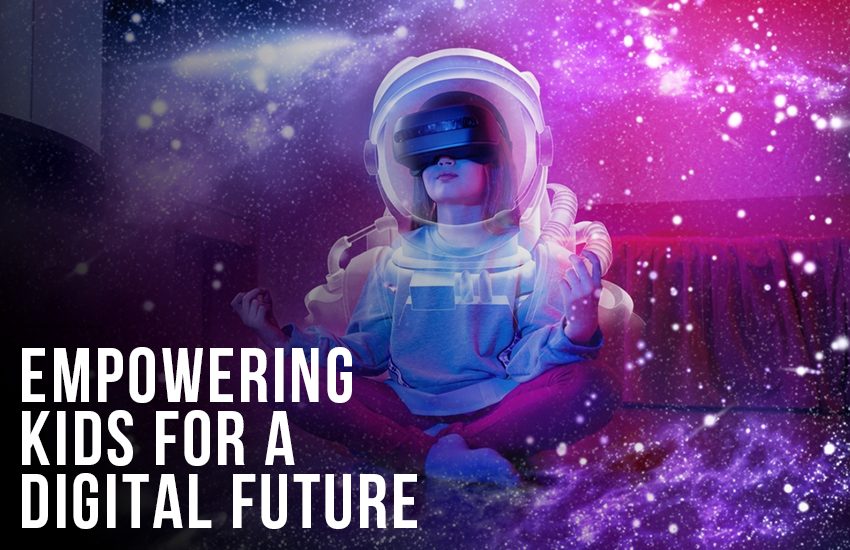
Empowering Kids for a Digital Future
As adults, we know that the future of the world will be 100% digital and we should prepare them for a future where technology will continue to shape our world. In today’s world, preparing kids for a digital future is imperative.
Digital literacy, problem-solving, creativity, critical thinking, and future-ready skills are vital for their success. Coding enhances their confidence, fosters innovation, and ensures they are responsible digital citizens. Empowering kids in the digital age equips them with the skills they need to thrive and contribute meaningfully to our evolving world.

